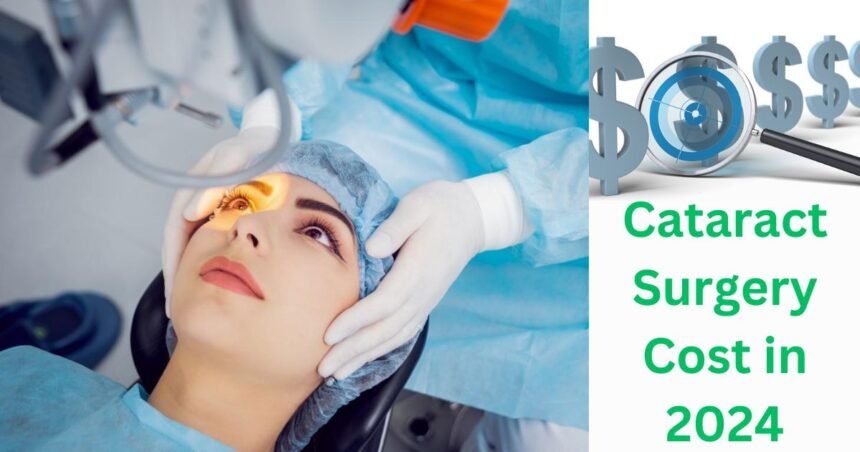Cataract Surgery Cost in India, USA and United Kingdom in 2024 :
what is cataract
The clouding of the eye’s lens, known as a cataract, can impair vision. The lens, normally clear, becomes cloudy over time, causing blurry or dim vision, difficulty seeing in low light, and glare sensitivity. Cataracts often develop slowly and may not initially cause significant vision problems. However, as they progress, they can interfere with daily activities and may eventually lead to blindness if left untreated. Cataracts are most commonly related to aging, but they can also result from injury, certain medications, medical conditions like diabetes, or prolonged exposure to ultraviolet light. Surgery is typically required to remove the cloudy lens and replace it with an artificial one, thereby restoring clear vision.
What is the main cause of cataract?
Cataracts commonly form due to aging or injury, causing changes in the lens tissue where proteins and fibers gradually degrade.

cataract surgery cost in india, united states and united kingdom
The expense of cataract surgery fluctuates greatly, influenced by factors including the geographic location, the chosen clinic or hospital, the level of surgeon expertise, and the inclusion of supplementary procedures or services. Here’s a general comparison of the approximate costs in India, the United States, and the United Kingdom:
India:
- Cataract surgery in India is often more affordable compared to Western countries.
- The price may vary from approximately Rs 20,000 to Rs 1,00,000 or higher, contingent upon factors such as the surgical approach (traditional versus advanced techniques), the selection of intraocular lens (IOL), and the facility conducting the procedure.
- Prices may vary in different cities and regions across India.
United States:
- Cataract surgery in the United States tends to be more expensive compared to many other countries.
- The average cost without insurance can range from $3,000 to $5,000 per eye. However, this cost can be significantly higher at renowned clinics or for premium services.
- With insurance coverage, out-of-pocket expenses for cataract surgery can be substantially lower, depending on the individual’s insurance plan.
United Kingdom:
- In the United Kingdom, cataract surgery is typically covered by the National Health Service (NHS) for eligible patients.
- For private cataract surgery, the cost can vary but is generally lower compared to the United States.
- Private cataract surgery costs in the UK can range from £1,000 to £3,000 per eye, depending on the clinic, surgeon, and type of lens used.
It’s crucial to recognize that these figures are approximate, and actual expenses can differ. Patients are advised to seek guidance from their healthcare provider or eye surgeon to obtain precise pricing tailored to their unique circumstances and requirements.
Click Here – Hair Growth Serum
cataract surgery advantages and disadvantages
Cataract surgery is a common procedure aimed at removing the cloudy lens from the eye and replacing it with a clear artificial lens to improve vision. Like any medical intervention, it has its advantages and disadvantages:
Advantages:
- Improved Vision: Cataract surgery can significantly improve vision, allowing individuals to see more clearly and perform daily activities with greater ease.
- Increased Independence: Enhanced independence is achieved through improved vision post-cataract surgery, as it diminishes the necessity for glasses or contact lenses, particularly for distance vision.
- Enhanced Quality of Life: Restoring clear vision can lead to a better quality of life, allowing individuals to engage in activities they enjoy without visual limitations.
- Safe and Effective: Cataract surgery is considered a safe and effective procedure, with a high success rate in improving vision and minimal risk of complications.
- Swift Recovery: A significant number of individuals undergo a rapid recuperation post-cataract surgery, witnessing noticeable enhancements in vision within a few days to weeks.
Disadvantages:
- Risk of Complications: While rare, complications such as infection, inflammation, bleeding, or retinal detachment can occur after cataract surgery.
- Postoperative Symptoms: Some individuals may experience temporary side effects after surgery, such as dry eyes, glare, halos, or double vision, which typically resolve over time.
- Need for Additional Procedures: In some cases, additional procedures may be required to address complications or optimize visual outcomes, adding to the overall cost and recovery time.
- Potential for Vision Changes: While cataract surgery aims to improve vision, there is a small risk of unexpected changes in vision, such as undercorrection, overcorrection, or development of other eye conditions over time.
- Cost: While cataract surgery is often covered by insurance, there may be out-of-pocket expenses for certain procedures, advanced technology lenses, or additional tests.
Overall, the benefits of cataract surgery typically outweigh the risks for most individuals, leading to improved vision and quality of life. However, it’s essential to discuss any concerns or questions with your eye doctor to make an informed decision about whether cataract surgery is right for you.
To avoid cataract surgery cost, adopt:

cataract home remedies
While home remedies may provide some relief, it’s important to consult with a healthcare professional for proper diagnosis and treatment of cataracts. Nonetheless, certain home remedies are believed to offer relief to some individuals:
- Healthy Diet: Incorporating antioxidant-rich foods, abundant in vitamins and minerals, into your diet might aid in slowing the advancement of cataracts. Consider adding fruits, vegetables, nuts, and seeds to your meals.
- Vitamin C: Foods high in vitamin C, such as oranges, strawberries, and bell peppers, may contribute to eye health.
- Omega-3 Fatty Acids: Foods like salmon, flaxseeds, and walnuts, which are rich in omega-3 fatty acids, may support eye health.
- Bilberry: Research indicates that bilberry extract could possess antioxidant properties that support eye health.
- Maintain Healthy Blood Sugar Levels: Effective management of blood sugar levels is crucial for individuals with diabetes, as it can aid in preventing or slowing the advancement of cataracts.
- Limit Alcohol and Quit Smoking: Excessive alcohol consumption and smoking can contribute to the development of cataracts, so reducing or eliminating these habits may be beneficial.
- Protect Your Eyes from UV Rays: Wear sunglasses that block UV rays when outdoors to protect your eyes from harmful sun exposure.
- Stay Hydrated: Ensuring sufficient water intake throughout the day is vital for maintaining overall health, which includes optimal eye health.
Remember, while these home remedies may offer some support, they are not a substitute for professional medical advice and treatment. If you suspect the presence of cataracts or any other eye condition, it’s imperative to seek evaluation and management from an eye doctor.









